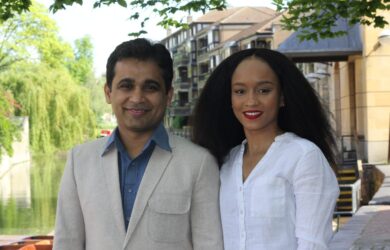
Ramit Debnath wins Alan Turing Enrichment Award to further his research on climate change misinformation.
Citizen science through public opinion and sentiments has become critical in just policy design.
Ramit Debnath
A Gates Cambridge has won a prestigious Alan Turing Enrichment Award to work on public understanding of climate change using machine learning and Artificial Intelligence.
Ramit Debnath [2018] will use the award to further his research on climate misinformation. He has been working on the Growing the future: Public perception and climate misinformation in emission reduction in the built environment project which addresses public perceptions of climate misinformation about emission reduction in the built environment. It seeks to identify misinformation echo chambers and triangulations in Twitter interactions on climate change, greenwashing and green advocacy.
The first part of the project deals with data-driven explorations of Twitter sentiments and interactions. Ramit, who is a Sustainability Fellow at Churchill College, is working with a group in Caltech to explore misinformation triangulations in corporate greenwashing across International Governmental Organisations and NGOs. So far the researchers have successfully modelled close to one million Twitter interactions by these groups since 2014, using joint topic sentiment analysis and vector autoregression to measure directionality in their communication.
The second part of the project deals with public policy and advocacy and establishing benchmarks for people-centric net-zero transition in the era of digitalisation. As part of this Ramit and his colleagues took part in COP26 and a hearing at the UK Parliament that enabled them to translate their data-driven findings to UK policymakers. Ramit is now working on the development of a data governance framework related to this.
The Alan Turing Enrichment Award, one of around 50 Community Awards, will provide Ramit with access to the Alan Turing Institute’s online community and resources, as well as a flexible grant to undertake research activity. Ramit says it will enable him to get access to the Alan Turing Institute’s social data science and climate research and foster longer term collaboration on climate change and machine learning. He says: “Citizen science through public opinion and sentiments has become critical in just policy design.”
*More information on Ramit’s research can be found here.












